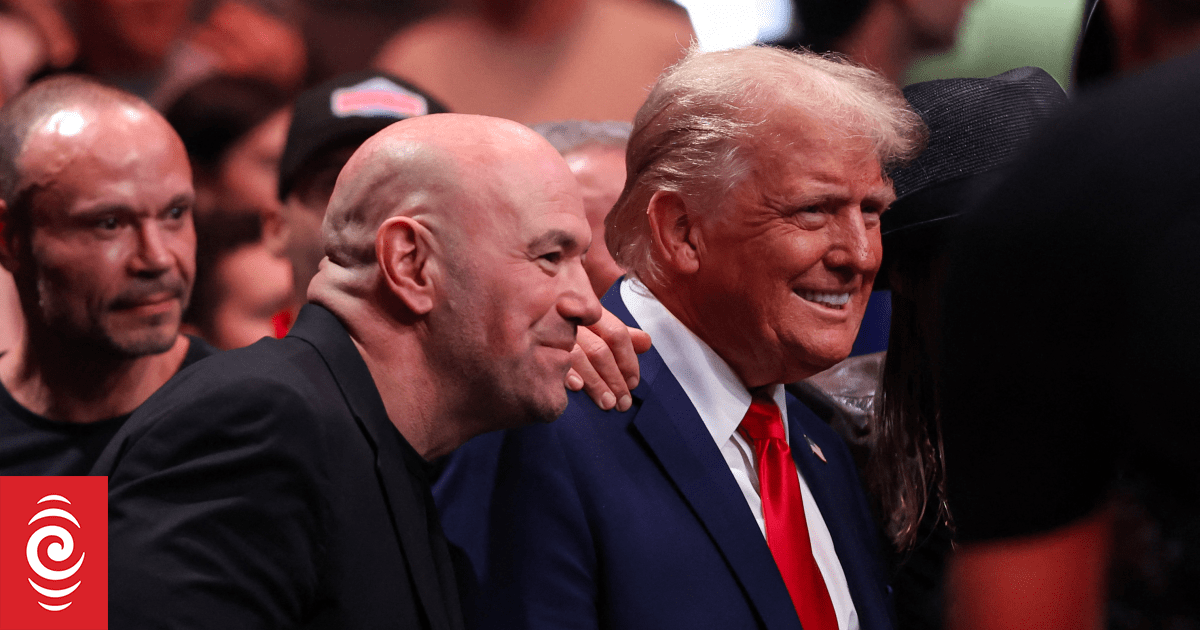
Podcaster Joe Rogan and President-elect Donald Trump pose for a photo during the UFC 309 event at Madison Square Garden on 16 November 2024 in New York City.
Photo: SARAH STIER
Dominant left-wing cultural values are ceding ground online to right wing ideologies, Times columnist James Marriott says.
Speaking to Sunday Morning Marriott – who is also a book reviewer – said the rise of podcasters such as Joe Rogan and Theo Von was a sign of a potential shift away from the ostensibly dominant “overwhelmingly liberal” arts and cultural sphere.
“This new popular culture that is more right wing… has become apparent to us in the aftermath of the election of Donald Trump, who, as part of his election campaign, went on an awful lot of right-wing podcasts,” he said.
“I think this was pretty important for Donald Trump’s election, not the main reason, but important. And I think we’re just beginning to wake up now to the idea that this… more right-wing popular culture exists, and in some ways is even more important than the old culture.”
The left had created an environment in which the right wing was seen as more provocative, and surprising, where people could say things that were more outrageous, he said.
“There’s a space to be filled… that the right is now filling and… this is not I should say, I think, by any means, something to be wholly celebrated.”
Not properly recognising the importance of this emerging culture had harmed the Democrats’ campaign Marriott said.

James Marriott is a book reviewer and a columnist for the Times in the United Kingdom.
Photo:
“Part of the problem that Kamala Harris’s campaign had was a slightly old-media view of the celebrity ecosystem and who mattered and who was influential,” he said.
Harris declined to interview on the Joe Rogan podcast before the election over fears of backlash from the wider Democratic party it’s been reported.
It was a mistake to say that this cultural shift was entirely organic, Marriott said.
Wealthy investors have been putting significant amounts of money into right wing and “anti-woke” podcasts, he said.
“They’ve been worried by what they perceive to be the left dominance of culture… and they have put money to try and remedy the situation and get conservative ideas into the cultural bloodstream.”
However, this did not invalidate the importance of the emerging right-leaning internet culture, he said.
“You can pay podcasters as much as you like to say what you want, but if the ideas aren’t resonating with people, they won’t catch on.”

Democrat Kamala Harris concedes the election on 6 November.
Photo: ANGELA WEISS / AFP
Podcasters like Rogan were so influential because they broke down the barrier between themselves and the audience, Marriott said.
“A lot of these influencers who have been coming out in support of Donald Trump, their words carry weight with their audiences because they’re not just the people who are entertaining them. They have a much more, kind of personal relationship.”
Many of these podcasts were critical of the censoriousness of the left, but were not dogmatically right wing, he said.
“Perhaps the division that we’re looking at may not be best characterised as left versus right. Maybe we’re talking more about establishment versus anti-establishment.
“Theo Von, for instance, has said that… one of his motivating issues in the election was the war in Gaza, which he’s really deeply opposed to. We think of that as a left-wing opinion, yet he voted for Donald Trump. And it’s all a bit more complicated than it can seem on the surface.
“If liberal politicians who believe in democracy and democratic institutions can sort themselves out, and make themselves a bit more attractive, and learn how to speak to these people, perhaps there is some kind of political rehabilitation and a way forward that that can be found,” he said.
Marriott said these podcasts were emblematic of a decline in deep reading which he saw as essential to a properly functioning democracy.
“It’s impossible to use social media, I think, to really form coherent or useful arguments, or to have useful debates about policy,” he said.

